Subjective Well-Being and Parenthood in Chile
- PMID: 34299858
- PMCID: PMC8304376
- DOI: 10.3390/ijerph18147408
Subjective Well-Being and Parenthood in Chile
Abstract
Being a parent plays an important role in people's life trajectory and identity. Though the general cultural perception is that having children is a source of subjective well-being, there is evidence that, at least in some societies, the subjective well-being of those who are parents is worse, in some aspects, than that of those who are not. This gap has been the object of interest and controversy. The aim of this study was to compare Chilean adults with and without children in a broad set of well-being indicators, controlling for other sociodemographic variables. A public national probabilistic database was used. The results show that, in terms of positive and negative affect, those who are not parents achieve greater well-being than those who have children. Other results also pointed in that direction. The implications of the social context and gender, which are aspects that pose a burden for the exercise of parenthood in Chile, are discussed.
Keywords: children; fatherhood; happiness; motherhood; parenting.
Conflict of interest statement
The authors declare no conflict of interest. The Chilean National Agency for Research and Development had no role in the design of the study; in the collection, analyses, or interpretation of data; in the writing of the manuscript; or in the decision to publish the results.
Figures
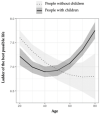
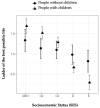
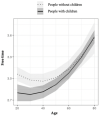
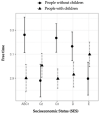
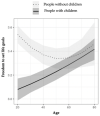
References
-
- Duarte-Duarte J. Contemporary childhoods, media and authority. Rev. Latinoam. Cienc. Soc. Niñez Juv. 2013;11:461–472. doi: 10.11600/1692715x.1121080812. - DOI
-
- MacBlain S., Dunn J., Luke I. Contemporary Childhood. Sage; London, UK: 2017. pp. 1–256.
-
- Paris School of Economics. [(accessed on 3 February 2021)]; Available online: http://www.parisschoolofeconomics.com/clark-andrew/HappinessandtheParent....
-
- McLanahan S., Adams J. The effects of children on adults’ psychological well-being: 1957–1976. Soc. Forces. 1989;68:124–146. doi: 10.2307/2579223. - DOI
-
- Brandel M., Melchiorri E., Ruini C. The Dynamics of Eudaimonic Well-Being in the Transition to Parenthood: Differences Between Fathers and Mothers. J. Fam. Issues. 2018;39:2572–2589. doi: 10.1177/0192513X18758344. - DOI
Publication types
MeSH terms
LinkOut - more resources
Full Text Sources
Medical
Miscellaneous

